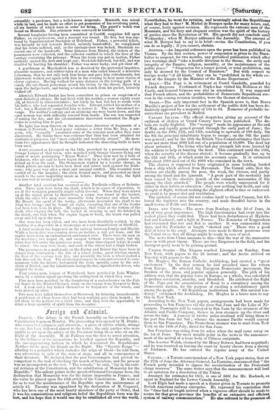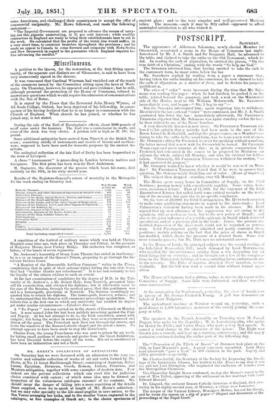larrigu anti enluninl.
FRANC'E. —The debate in the French Assembly on the revision of the Constitution began on Monday. The proceeding was opened by M. Dupin ; who counselled calmness and attention,—a piece of advice which, strange to say, has been followed almost to the letter; the only parties who were unable to act upon the advice of the President being those who sit on the Right of the Assembly. M. de Falloux was the first to arrest attention, by the boldness of the accusations he levelled against the Republic, and the uncompromising fashion in which he denounced the Republicans. Neither did he spare his friends on the Right. The "Spectre Rouge "— alluding to a pamphlet which forbodes the reign of blood—he told them, was advancing in spite of the state of siege, and all in consequence of their divisions. He declared that the past Governments had proved in- competent to the task of checking the march of Socialism, and the present was as incompetent as the rest. "The remedy," he said, "lay in the radi- cal revision of the Constitution and the substitution of Monarchy for the Republic." The salient points in the speech of General Cavaignac were, the declaration that Monarchy was for the future impossible in France; and the value he placed upon the 45th article of the Constitution. He went so far as to rest the maintenance of the Republic upon the maintenance of article 45. Tuesday was signalized by the declaration of M. Coquerel, who has been one of the most hearty members of the party of Order, that it was his conscientious and religious belief the Republican form was the best, and his hope that it would one day be estalzliahed all over the world._ Nevertheless, he went for revision, and tauntingly asked the Republicans what they had to fear? M. Michel de Bourges spoke for many hours, and, of course hotly against revision. Ile represents the extreme men of the Mountain, end his fiery and eloquent oration was the spirit of the history of parties since the Revolution of '89. His speech did not conclude until Wednesday ; when M. Berryer addressed the Assembly. The amount of what M. Berryer had to say is in brief—revise the Constitution, if you can do so legally ; if you cannot, abstain.
AUSTRIA.—An Imperial ordinance upon the press has been published in Vienna. By the first section, power of suspension is given to the Staat- halter to suspend, for two months, any periodical publication which after two warnings shall " take a hostile direction to the throne, the unity and integrity of the Empire, religion, morality, or the maintenance of the public peace." " Suspension for a longer period, or total prohibition, can only be decreed by the Council of Ministers." But with respect to foreign works " of all kinds," they can be "prohibited in the whole ex- tent of the Empire by the Minister of the Home Department."
ITALY.—The Pope is in retirement at Castel Gandolfo, guarded by French dragoons. Ferdinand of Naples has visited his Holiness at the Castle and General Gemeau was also in attendance. It was supposed that French affairs, and the probabilities of Democratic Republican suc- cess in the coming revision troubles, were the themes of discussion.
SPAIN—The only important fact in the Spanish news is, that Bravo Murillo's project of law for the settlement of the public debt has been de- finitively approved by a majority of 154 to 52. Rumours of probable in- surrections are prevalent in Madrid.
CANARY ISLANDS.—The official despatches giving an account of the outbreak of cholera at Grand Canary have been published. The de- tails are really frightful. The "scourge" made its appearance at the end. of May, and rapidly gained ground through the early part of June ; the deaths on the 10th, 11th, and 12th, reaching to upwards of 100 daily. On the 8th the principal inhabitants began to escape ; on the 9th the panic was general ; and by the 10th the British Vice-Consul estimates that there were not more than 4000 left out of a population of 16,000. The dead lay about unburied. The living who had any strength- left were hunted. by the soldiers to help in burying the dead. This continued until the 16tht when the severity of the disease abated ; it became gradually less up to the 23d and 24th, at which point the accounts cease. It is estimated that about 1000 died out of the 4000 who remained in the town.
The cholera is supposed to have originated in some bedding landed from a ship which arrived from Havannah. The Consul adds, that the victims are chiefly among the poor, the weak, the vicious, and partly among the timid and the ignorant. "A great part of the mortality has been caused by the absolute dearth of the common necessaries of life among the class attacked." The people were wholly unprepared for it either in their habits or education : they saw nothing but death, and only thought of flight, without making the slightest effort to face or endeavour to avoid it by proper diet and ventilation.
The epidemic of course did not confine itself to Grand Canary, but fol- lowed the fugitives into the country, and made dreadful havoc in the small towns of Felde and Aruncas.
Isms AND CHINA.—The news from Bombay, to the 2d of June, is not of very great importance. The high functionaries had crept into the coolest places they could find. There had been disturbances at Hydera, bad and Lucknow, and a fight at Nursee. The Zemindar of Kuppradeen had evacuated that fort and fled to another. It was cannonaded nine days, and the Zeminclar at length " shotted out." There was a good. deal of fever in the army. Attempts were made to throw pontoons over the Cabal river, that all things might be ready in case of need. The news from China amounts to this—that the war of the succession goes on with great vigour. There are two Emperors in the field, and the insurgent party seem to be gaining ground.
UNITED STATES.—The Niagara reached Liverpool on Sunday, from New York, with papers to the 2d instant ; and the Arctic arrived On Tuesday with papers to the 5th. Dr. Hughes, the Roman Catholic Archbishop, had created a "great , excitement" by the first sermon he had preached since his return from Europe. He attacked the European Democratic movement, the freedom of the press, and popular opinion generally. The pith of his address was, that the popular voice in Europe, as a whole, was calculated to produce revolution, anarchy, and bloodshed. He attributed the ffight of the Pope and the assassination of Rossi to a conspiracy among the Democratic faction, for the purpose of exciting a revolutionary spirit among the people. "All Republican institutions have this natural ten- dency," exclaimed the Archbishop. Dr. Hughes is a brave man to say this in New York.
According to the New York papers, arrangements had been made for proceeding to San Francisco via the river San Juan and the Lake of Ni- caragua. Passengers will be conveyed to San Juan by the steamers of the Atlantic and Pacific Company, thence in iron steamers up the river and across the lake. A journey of twelve miles overland. will bring them to the port San Juan del Stir; whence the steamer Pacific would convey them to San Francisco, The Prometheus steamer was to start from New York on the 14th of July, direct-for San Juan.
San Francisco was rising from its ashes when the mail came away on the 1st of June. The most notable point in the news is the announce- ment of the arrival of a large body of Chinese emigrants.
The deserter Walsh, claimed by Sir Henry Bulwer, had been acquitted; and he was received on leaving the court by hearty cheers from a throng of Irishmen. He has entered the regular army of the United States.
CANADA.—A Toronto correspondent of a New York paper states, that on the 27th of June the Attorney-General, La Fontaine, announced that "the French party intended to oppose the secularization of the Protestant clergy reserves." The same writer says that the announcement will lead. to an agitation for a dissolution of the Union.
Amongst the estimates for 1851, is one of 500/. for Mr. Roebuck, as agent in England for the Lower Canada Assembly.
Lord Elgin had made a speech at a dinner given in Toronto to promote British American railway enterprise. He expressed his conviction that the "time had at length arrived when a vigorous effort should be made to secure for that great province the benefits of an extensive and efficient system. of railway communication." He also referred. to the. presence et
some American5 and challenged their countrymen to accept the offer of commercial reciprocity. Mr. Howe follewed, and made the 'following statement--.
"The Imperial Government are prepared to advance the means of carry- ing out this gigantic undertaking, at St per cent interest ; while wealthy contractors in England are ready to bring their establishments here to aid in the work. He caleulated that the profits of the trunk line would suffice, in a very short time, to construct branches throughout the provinces ; and he made an appeal to Canada to come forward and cooperate with Nova Scotia and New Brunswick in regard to the guarantee which England requires be- fore advancing the needful."



























 Previous page
Previous page